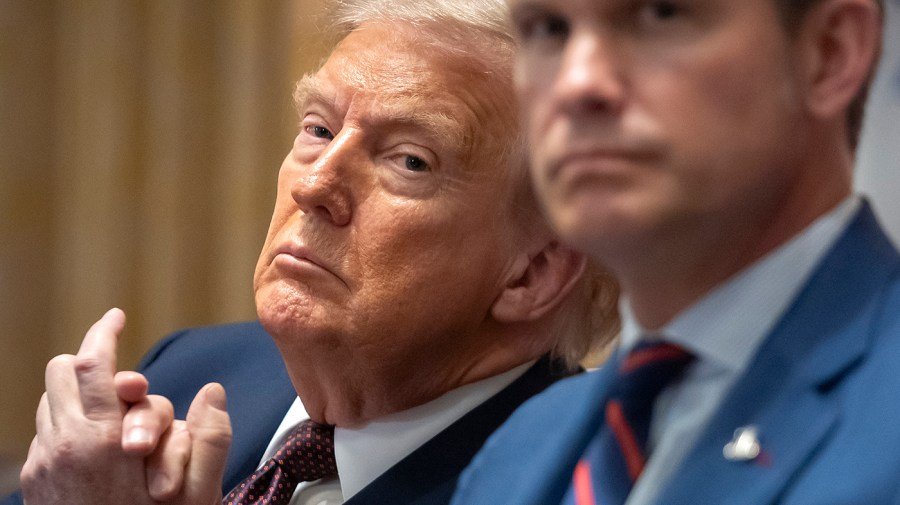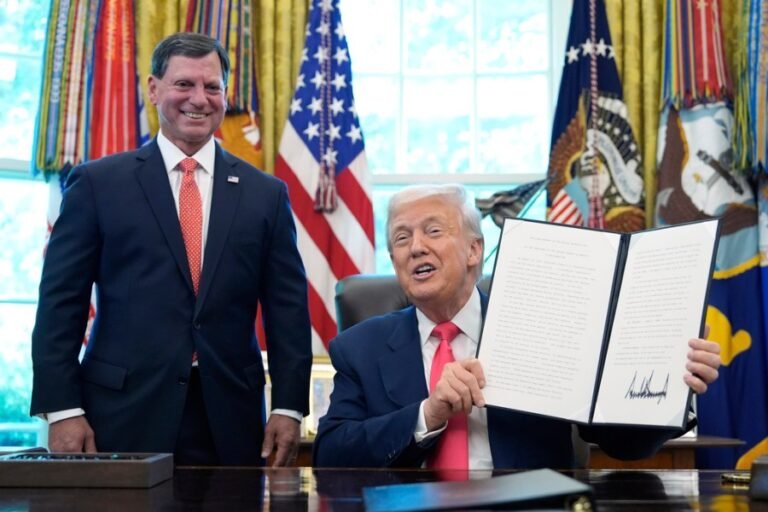
President Trump’s new effort to cancel funding previously approved by Congress through “pocket rescissions” is setting up a political land mine for Congress as it races to avert a government shutdown by Sept. 30.
The so-called pocket rescission comes as Democrats had warned that efforts by the administration to unilaterally claw back money would seriously undermine the fragile bipartisanship required to fund the government.
And some Republicans are also sounding the alarm, questioning whether the move is legal and saying it undermines the will of Congress.
Senate Minority Leader Chuck Schumer (D-N.Y.) said in a statement Friday that the latest announcement by the administration is evidence that “Trump and Congressional Republicans are hellbent on rejecting bipartisanship and ‘going it alone’ this fall.”
“As the country stares down next month’s government funding deadline on September 30th, it is clear that neither President Trump nor congressional Republicans have any plan to avoid a painful and entirely unnecessary shutdown,” he said.
Senate Republicans’ chief funding negotiator, Appropriations Committee Chair Susan Collins (R-Maine), meanwhile, said “any effort to rescind appropriated funds without congressional approval is a clear violation of the law.”
“Given that this package was sent to Congress very close to the end of the fiscal year when the funds are scheduled to expire, this is an apparent attempt to rescind appropriated funds without congressional approval,” she said, while also citing Congress’s “power of the purse.”
“Instead of this attempt to undermine the law, the appropriate way is to identify ways to reduce excessive spending through the bipartisan, annual appropriations process,” she added, noting Congress “approves rescissions regularly as part of this process.”
The rescissions request sent Thursday to Speaker Mike Johnson (R-La.) calls for yanking back about $5 billion in funding for the State Department and the U.S. Agency for International Development (USAID), which the administration dismantled earlier this year.
Under the budget law governing the process, known as the Impoundment Control Act (ICA), the administration asks Congress to cancel select funds. While lawmakers consider that request, the administration is also allowed to temporarily withhold funding for 45 days. If lawmakers reject the request, the funds must be released.
Democrats were furious earlier this summer when Republicans in Congress approved such a request along party lines, accusing them of using a partisan maneuver to undo funding that had passed on a bipartisan basis.
But Trump’s latest proposal is known as a pocket rescission because there are fewer than 45 days until the end of the fiscal year on Sept. 30, which means the administration can bypass Congress altogether and simply run out the clock.
Some lawmakers have described the request as illegal and say it’s strategically timed close to the end of the fiscal year so that targeted funds can be canceled without Congress’s say-so.
Sen. Patty Murray (Wash.), the top Democrat on the Senate Appropriations Committee, criticized the targeted cuts as a “get-out-of-jail free card for this administration to simply not spend investments Congress has made” and said lawmakers “should instead insist on making decisions over spending through the bipartisan appropriations process.”
Trump officials have argued the tactic is legal. Office of Management and Budget (OMB) Director Russell Vought earlier this summer described the controversial maneuver as “one of the executive tools” that are “on the table” to reduce spending.
A White House official argued on Friday that they don’t “believe that this should distract from the appropriations process that is underway.”
“Talked with one senator this morning who said, you know, this will take time away from the appropriations process to consider this bill,” they said. “Again, we don’t believe that this bill needs to be considered because it is an executive mechanism that allows us to bank the savings just by using the process.”
They also pushed back on arguments that the move signals the administration wants “a shut down.”
“That is not true,” the official said. “This in some respects we believe will help with those members who are not normally accustomed or willing to vote for a continuing resolution, that will in effect keep the government open. So, we believe this is in no way contributing to the argument put out there by Democrats this will lead to a government shutdown.”
Since news broke of the package of cuts, a number of conservatives have cheered the move keeping up calls for more rescissions.
“President Trump just scrapped $5 BILLION in foreign aid with a pocket rescission — the first in nearly 50 years,” Rep. Ralph Norman (R-S.C.) posted Friday morning on social platform X. “The President is putting America FIRST instead of sending your tax dollars overseas!!”
Among the cuts the administration has touted in the proposal are the cancellation of $3.2 billion for the development assistance account for USAID, $393 million for the account covering “payments for the U.S. share” of United Nations “peacekeeping assessments,” and $521 million for an account that provides “funding for the assessed contributions” to the U.N. and other international organizations.
The administration described the funds as “woke, weaponized, and wasteful,” while listing examples of funding for items like “climate resilience in Honduras,” “micro-insurance for smallholder farmers and microbusinesses in Colombia for climate disaster response,” the World Trade Organization and the International Labor Organization that it said works to “punish U.S. corporate interests abroad.”
“The Trump Administration is committed to getting America’s fiscal house in order by cutting government spending that is woke, weaponized, and wasteful,” the White House said.
The cuts mark the administration’s latest effort targeting foreign aid this year.
In July, Trump successfully clawed back about $9 billion in previously allocated funding for foreign aid and public broadcasting, after Republicans in both chambers approved the cuts with zero Democratic support — but not without some headaches for GOP leaders.
There was uncertainty around the bill’s chances of passage at the time over concerns about cuts to global health programs, as well as how local and tribal stations would fare from cuts to public media funds. Some GOP lawmakers also clashed with the administration at the time over what they argued was a lack of information in the administration’s request.
In an interview on Friday, Bobby Kogan, a former Senate budget aide and senior director of federal budget policy at the left-leaning Center for American Progress, singled out the administration’s renewed focus on foreign aid in the most recent rescissions request.
“I think that they were worried that if they had done all of this at the time, it wouldn’t have passed,” he argued. “There’s a legal way to rescind money, which they took for foreign aid before, and then they’re sending more for it through illegal means, and that really shows that the whole purpose is to get around Congress, which they’ve been explicit about.”
He compared the request to introducing an “atom bomb” just as Congress prepares to ramp up funding talks ahead of the shutdown deadline.
“This definitely increases the likelihood of a shutdown,” he said.
Brett Samuels contributed.


